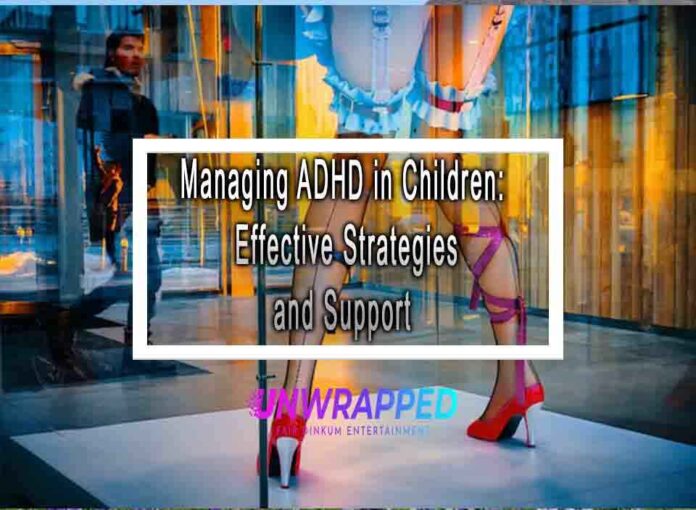Attention-deficit/hyperactivity disorder (ADHD) is a neurodevelopmental disorder that affects both children and adults. Managing ADHD in children involves a combination of strategies and support to help them thrive at home, in school, and in social settings. Here are effective strategies and support options for managing ADHD in children:
1. Medical Evaluation:
- Seek a medical evaluation by a healthcare professional to diagnose ADHD accurately. This may involve a pediatrician, child psychiatrist, or psychologist.

2. Medication Management:
- In some cases, medication may be prescribed to help manage ADHD symptoms. Common medications include stimulants like methylphenidate (e.g., Ritalin) and amphetamine (e.g., Adderall). Non-stimulant medications like atomoxetine (Strattera) and guanfacine (Intuniv) are also options.
- Medication should be administered and monitored by a healthcare professional to ensure proper dosage and assess effectiveness and side effects.
3. Behavioral Therapy:
- Behavioral therapy, such as cognitive-behavioral therapy (CBT) or behavioral modification techniques, can help children develop strategies to manage their impulsivity and improve focus.
4. Educational Support:
- Work with your child’s school to develop an Individualized Education Plan (IEP) or a 504 Plan to provide accommodations, such as extended time for assignments and testing, in-class support, and structured routines.
5. Parent Training:
- Many parents benefit from training in ADHD management, which helps them understand the condition, learn effective parenting strategies, and reduce stress in the family.
6. Consistent Routine:
- Establish and maintain a consistent daily routine at home and school to provide structure and predictability for the child.
7. Homework Strategies:
- Create a quiet, organized space for homework.
- Break tasks into smaller, manageable segments.
- Use visual schedules or checklists.
- Implement short breaks to accommodate a child’s attention span.
8. Mindfulness and Relaxation Techniques:
- Teach relaxation techniques like deep breathing, mindfulness, or yoga to help children manage stress and anxiety.
9. Physical Activity:
- Regular physical activity can help reduce hyperactivity and improve attention and self-regulation.
10. Adequate Sleep and Nutrition:
- Ensure your child gets enough sleep and maintains a balanced diet to support overall well-being.
11. Support Groups:
- Consider joining a support group for parents and families dealing with ADHD. Sharing experiences and advice with others can be helpful.
12. Positive Reinforcement:
- Implement a reward system for appropriate behaviors, which can motivate and reinforce positive actions.
13. Limit Screen Time:
- Set reasonable limits on screen time and encourage outdoor activities and other forms of play.
14. Open Communication:
- Maintain open and supportive communication with your child. Encourage them to express their feelings and frustrations.
15. Encourage Interests:
- Foster your child’s interests and hobbies to boost self-esteem and provide a sense of accomplishment.
Remember that every child with ADHD is unique, and what works for one may not work for another. Tailor your approach to your child’s specific needs and seek guidance from healthcare professionals, therapists, and educators who specialize in ADHD. Consistent support and patience are key to helping children with ADHD succeed and build their self-esteem.












